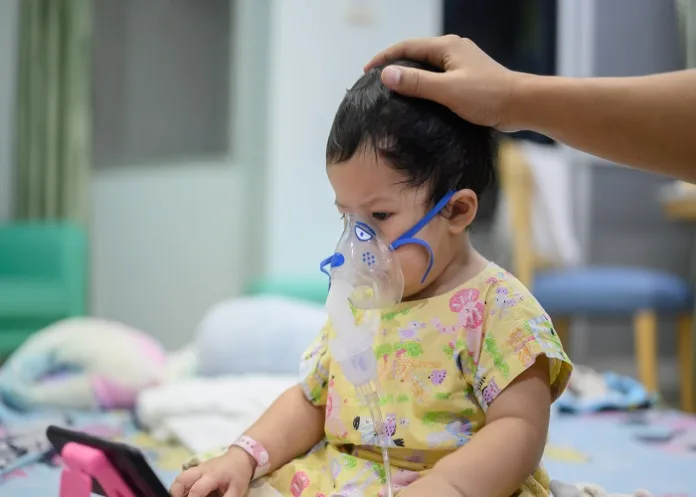An injection could reduce by 80% the numbers of babies and young children admitted to hospitals with respiratory syncytial virus (RSV) – which kills 100 000 children under five every year worldwide – according to a recent study.
The research, published in the New England Journal of Medicine, involved 8 058 healthy babies aged up to 12 months from the UK, France and Germany, who were approaching their first RSV season.
Of this group, 4 037 infants were randomly assigned to received the monoclonal antibody nirsevimab, while 4 021 babies received standard care.
Of the babies who received the jab, only 11 (0.3%) were hospitalised, in comparison with the 60 babies (1.5%) who were hospitalised after receiving just the standard care.
Researchers said the trial showed nirsevimab reduced the likelihood of hospital admission from six admissions per 1 000 in previously healthy infants, to one admission per 1 000 in previously healthy infants who received the drug, which is an efficacy of 83.2%.
The Guardian reports that the research was funded by Sanofi and AstraZeneca, producers of the shot.
Nirsevimab was approved for use in the UK by the Medicines and Healthcare products Regulatory Agency in November 2022 but is yet to be offered within an immunisation programme.
Professor Calum Semple, professor of child health and outbreak medicine at the University of Liverpool and a respiratory consultant at the Alder Hey Children’s Hospital, said: “RSV commonly causes an unpleasant heavy snotty cold and earache in babies but can lead to bronchiolitis, a severe disease characterised by feeding difficulties, dehydration, chest infections requiring hospital admission and respiratory failure requiring intensive care.
“With nirsevimab, we have a single injection that has now proven highly effective in healthy infants. It may be time for the UK to extend the seasonal RSV immunisation programme to all newborn infants to save them from the misery of bronchiolitis and to take the pressure off hospital services.”
Dr Simon Drysdale, co-study leader and consultant paediatrician at St George’s University hospitals, said: “RSV is a very contagious infection and every year our wards are full of babies with breathing and feeding problems. This study shows the potential impact and safety of a monoclonal antibody injection.”
Study details
Nirsevimab for Prevention of Hospitalisations Due to RSV in Infants
Simon Drysdale, Katrina Cathie, Saul Faust, et al.
Published in the New England Journal of Medicine on 28 December 2023
Abstract
Background
The safety of the monoclonal antibody nirsevimab and the effect of nirsevimab on hospitalisations for respiratory syncytial virus (RSV)–associated lower respiratory tract infection when administered in healthy infants are unclear.
Method
In a pragmatic trial, we randomly assigned, in a 1:1 ratio, infants who were 12 months of age or younger, had been born at a gestational age of at least 29 weeks, and were entering their first RSV season in France, Germany, or the United Kingdom to receive either a single intramuscular injection of nirsevimab or standard care (no intervention) before or during the RSV season. The primary end point was hospitalistion for RSV-associated lower respiratory tract infection, defined as hospital admission and an RSV-positive test result. A key secondary end point was very severe RSV-associated lower respiratory tract infection, defined as hospitalisation for RSV-associated lower respiratory tract infection with an oxygen saturation of less than 90% and the need for supplemental oxygen.
Results
A total of 8058 infants were randomly assigned to receive nirsevimab (4037 infants) or standard care (4021 infants). Eleven infants (0.3%) in the nirsevimab group and 60 (1.5%) in the standard-care group were hospitalised for RSV-associated lower respiratory tract infection, which corresponded to a nirsevimab efficacy of 83.2% (95% confidence interval [CI], 67.8 to 92.0; P<0.001). Very severe RSV-associated lower respiratory tract infection occurred in 5 infants (0.1%) in the nirsevimab group and in 19 (0.5%) in the standard-care group, which represented a nirsevimab efficacy of 75.7% (95% CI, 32.8 to 92.9; P=0.004). The efficacy of nirsevimab against hospitalization for RSV-associated lower respiratory tract infection was 89.6% (adjusted 95% CI, 58.8 to 98.7; multiplicity-adjusted P<0.001) in France, 74.2% (adjusted 95% CI, 27.9 to 92.5; multiplicity-adjusted P=0.006) in Germany, and 83.4% (adjusted 95% CI, 34.3 to 97.6; multiplicity-adjusted P=0.003) in the United Kingdom. Treatment-related adverse events occurred in 86 infants (2.1%) in the nirsevimab group.
Conclusions
Nirsevimab protected infants against hospitalisation for RSV-associated lower respiratory tract infection and against very severe RSV-associated lower respiratory tract infection in conditions that approximated real-world settings.
NEJM article – Nirsevimab for Prevention of Hospitalisations Due to RSV in Infants (Open access)
See more from MedicalBrief archives:
Infant RSV drug gets green light from FDA panel
Respiratory virus killing 100,000 children a year – systemic analysis
UK approves one-shot RSV vaccine for babies
FDA panel green-lights RSV pregnancy jab, but concerns persist

